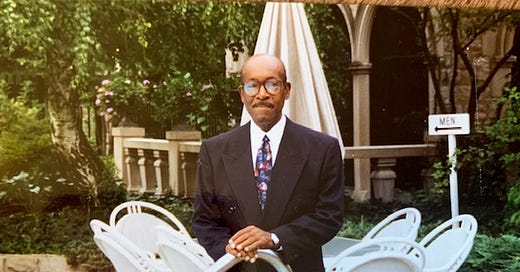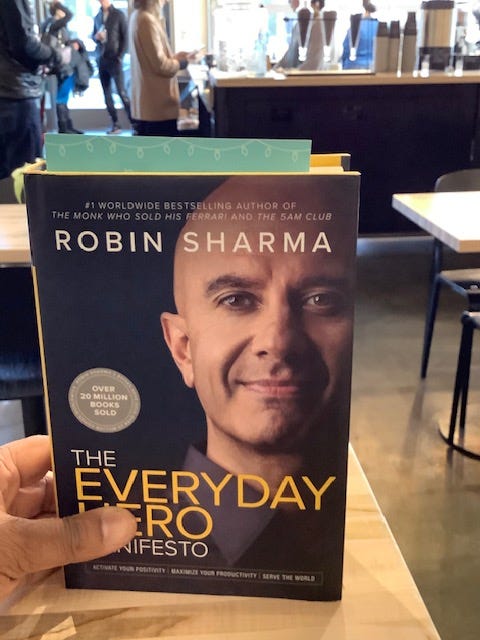Why The Word "Grind" Nauseates Me.
My Dad's Untimely Death and What it Taught Me About Becoming a Slave To Work
It’s the news no one wants to hear.
While home at my suburban Chicago apartment in the Fall of 1996, the phone rang. Amid the din of patient monitors and other hospital-ish sounds, a voice appeared on the line:
“Is this Michael? I am calling from [hospital name ] in London on behalf of your father Madison Scott. He was found on the floor unconscious at the hotel he was staying at here in the city today. [Pause] He had a heart attack and was rushed to our hospital. While in the operating room, we were unable to save him. We are so sorry.”
My dad was an amazing man. Erudite. Compassionate. Wise. Always had time for others. He was my best friend and confidant, the greatest dad a young man could ever ask for.
He had a long career at The Ohio State University ascending to the role of Executive Assistant to the President and Secretary of the Board of Trustees. (Fun Fact — If you happen to be an Ohio State graduate from 1979 to 1993 then take a moment and check out your diploma — his name is emblazoned on your diploma.)
He retired in 1993 hoping to enjoy a life of travel and leisure. Unfortunately, under the weight and stress of his working years which led to heart issues, his life was cut short.
I thought of my dad recently while reading a chapter entitled “How Heavyweights Work” in the book The Everyday Hero Manifesto. It examines an often heard theme that nauseates me whenever I hear it:
“In order to get ahead in life and achieve success, you’ve gotta grind.”
My dad was the embodiment of this theme — grind and grind some more at the expense of his health and well-being — which sadly occurred during what should have been the legacy years of his life.
So why has grinding become such a popular part of our vernacular? Robin Sharma, author of The Everyday Hero Manifesto offered this thought:
“Our culture trains us to feel shame if we’re not “hustling and grinding” by working most of the time”
He continues:
“The way most people work dates back to an ancient era. The idea that working longer and harder makes you more productive and better is outdated. And profoundly flawed.”
Like me, Sharma admits to not being a fan of “hustling and grinding” as a way of being noting that in the end “it’s unsustainable over the course of a career (or even a quarter)”
“I wish my dad had embraced this view because it may have saved his life.”
In that chapter, Sharma adds that we now….. “exist in a completely different period known as the Mastery Economy where you are rewarded not for hours spent toiling away at work but for “the richness, impact, and experience of magic that our craft delivers to others”
Circling back to the chapter title, Sharma offers this:
“The heavyweights who send masterwork into the marketplace are the ones who receive the most money, acclaim, lifestyle freedom, and spiritual satisfaction.”
He also talks about the importance of regularly refueling, regenerating, replenishing, and centering ourselves on the life journey. And in an ode to folks like me who regularly take naps, he says that….
“Legendary Producers Are Professional Resters.”
I love my dad. Think about him almost every day. But I’ve committed myself over the years to steering clear of the “work grind” obsession that ended his life prematurely. He are 5 quick lessons that all of this has taught me
Less Is OK: My life advisor Casey Kotchmer throws shade on the notion of always needing to give 100% to our work. He says at times 80%, 60%, or even less than 50% is OK, particularly as we get older. Sharma seconds that: “So remember that the secret to getting more headlining work done is to work a lot less.”
Embrace The Pareto Principle: The simple adage here is that you are far more productive when you work smarter rather than harder. A friend of mine calls this “Addition By Subtraction.” In his bestselling book 80/20 Principle, bestselling author Richard Koch reminds us that 80% of your results come from 20% of the things we work on. So why not focus on the few things that are producing a meaningful return while allowing the rest to fall away.
Walk This Way: Walking is one of the most restorative activities you can engage in for your health and mental well-being. In fact, the Japanese swear by it as a health and longevity practice. Recently, I’ve taken to walking 8 miles to and from my WeWork location in Denver. I highly recommend it as a self-care practice.
I care, BUT NOT THAT MUCH: This has been my stress reduction mantra for years. In other words, when I feel overloaded, this is my mental prompt to let it go and if possible, call it a day.
Go Where Your Energy Is NOW: Life is too short to spend your time grinding away for a tomorrow that may not arrive. Or pursuing financial gains that you may not have the opportunity to enjoy once you’re in a state of rigor mortis. So live in the moment. Be you and do you… NOW.






Such a great piece, Michael. So true, as well.
This is a great piece! Really great! I was once told by the CEO of a giant corporation that in order to "reach the top," one must put work above everything, including family. I took him at his word and altered my life plan to make family, friends, and relationships my top priorities. That was 30 years ago, and my life improved immensely. Thank you for this.